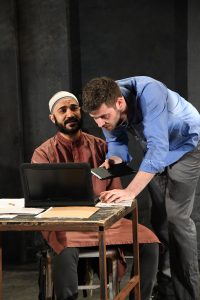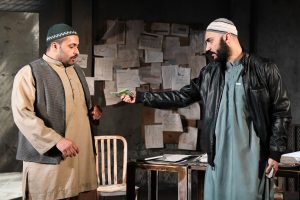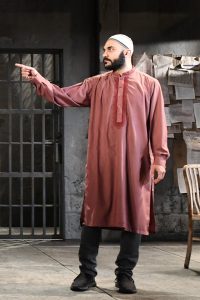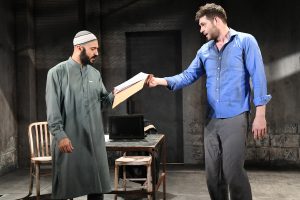They play adversaries of sorts in “The Invisible Hand,” but actors Thomas Keegan and Maboud Ebrahimzadeh have at least one thing in common: both considered other professions before deciding to become actors.
“I thought I wanted to be a cop for a little while,” said Keegan, who studied criminal justice and English at the University of Delaware, working as a seasonal officer with the Dewey Beach Police Department before graduating. “I got some on-the-job experience and realized that wasn’t the job I wanted.”

The job he wanted came when he started working at the American Shakespeare Center in Staunton, Virginia — meeting the woman who is now his wife and working alongside his dad. “My father is an actor as well,” said Keegan, “though he came to the career a little later in life; he’s an English professor as well. It was just something I loved, and I knew it was what I wanted to do with my life.” With a master of fine arts degree in theater from the Academy for Classical Acting at the Shakespeare Theatre at the George Washington University, he was on his way.
Ebrahimzadeh, too, took a roundabout route to the stage. “I’m a D.C. native,” he said. “I mean, originally from Iran, but raised here in the U.S. for the greater portion of my life.” He started acting “in my early-to-late 20s. I was studying medicine before I switched over. Theater is what ended up working for me.”
A kid who grew up watching movies — “Raiders of the Lost Ark,” “Indiana Jones,” James Bond, “Back to the Future” — Ebrahimzadeh said the stories did more than just help him perfect his American accent. “Acting’s been a large part of my life, just not in the most direct way. Watching people and listening to how they talk is one of the ways I learned how to be me.”
Both men are making their Olney campus debut in “The Invisible Hand,” a work by Pakistani-American playwright Ayad Akhtar, whose 2012 play “Disgraced” won a Pulitzer (and a Tony nomination).
“I play a guy named Nicholas Bright, who is a banker stationed in Pakistan,” said Keegan. Bright works for the minister of water until he is kidnapped—and his quest to escape his captors is just one of the issues at the play’s center. “They get the wrong guy and the banks can’t negotiate my ransom.”

It’s a thriller, and Keegan doesn’t want to give too much away. But he did say that “it’s about our reliance on money, and the focus of power in the hands of the very few. It’s complicated.”
“It’s a wild ride, for sure,” said Ebrahimzadeh, whose character, Bashir, is tasked with guarding Nick Bright. “It’s tense and it’s poignant—and it’s great! It’s a very necessary play. I think Ayad Akhtar really struck something when he wrote this.”
It’s Ebrahimzadeh’s second performance of “The Invisible Hand,” and he said revisiting the play has been great. “Rarely do you get a chance to take a second crack at something like this,” he said. “We talk a lot about globalism, but we don’t talk about its effects on developing nations — or nations that have developed, just in a slightly different way than how we originally intended. This gives us an insight into the effects of (globalization) on the ground; it provides a slightly different perspective.”
Rather than paint with broad brush strokes and loaded words like “extremism” and “radicalism,” a piece like “The Invisible Hand” shows the plight of the people whose leaders are driven to extremes. “This particular play focuses on a small group of people who are, sort of, peaceful l— and are dealing with the effects of surrounding groups like ISIS and Al-Qaeda. And they are not that, but they are eventually pushed to the brink,” Ebrahimzadeh said.

“It’s a tough subject,” he added. “A tough, heavy, deep subject — it’s a quagmire. And it’s really easy to get lost in the weeds. I think one of the virtues of this play is that it really shows the difference between idealism and what happens to idealism when it’s put under intense pressure.”
Ebrahimzadeh knows that as an American of Iranian descent, he will never really know how it feels to be Bashir. “But what I do think is particularly wonderful about this for me is that I have to ask myself these really different questions and reconcile my own personal feelings and politics about America’s role in other countries.”
And while the play examines that without flinching and reaches out to examine some of the world’s most pressing and intractable global issues, it keeps at its heart the human stories that allow the audience to enter what would normally be an impenetrable corner of the world.
“Look, the primary problem of the play is that this guy needs to get the hell out of this room,” Keegan said, noting that like himself, the character he plays has a wife and a 3-year-old child. That plot point makes playing Nick Bright easier and harder, too. “Complicating that problem, he’s being held by these people who are fractious. There’s suspicion in their own group; there’s some conflict there. Part of the brilliance of the play is the way it shifts between heightened moments of intellectualism and emotion.”
These are two people from different parts of the world facing the same problems, he observed. And that ability to examine micro and macro issues from different perspectives is what gives the play its heart.

“It’s very easy to villainize people,” said Keegan. “And when people talk about the divisiveness we face — in media, politics and day-to-day civil liberties — part of what we do is we villainize ‘the other.’ We find a way to make their motives evil; we don’t think of them as people. This play shows you something different.”
“These are important topics that we need to be facing and remembering,” he added. “I think it’s so easy to be complacent. I think we need to challenge ourselves.”
This play, he adds, “is messy. It’s violent; it’s difficult. It shows us that we need to try compassion because without compassion, we’re doomed.
“The Invisible Hand” runs through June 10 at the Mulitz-Gudelsky Theatre Lab at Olney Theatre Center for the Arts, 2001 Olney-Sandy Spring Road, Olney. Regular performances begin at 7:45 p.m. Wednesday through Saturday; 1:45 p.m. Saturday, Sunday and Wednesday, May 30. An audio-described performance for the blind and visually impaired is set for 7:45 p.m. Wednesday, May 23, and a sign-interpreted performance for 7:45 p.m. Thursday, June 7. Tickets start at $54, with discounts available for groups, seniors, military and students. Call 301-924-3400 or visit olneytheatre.org.